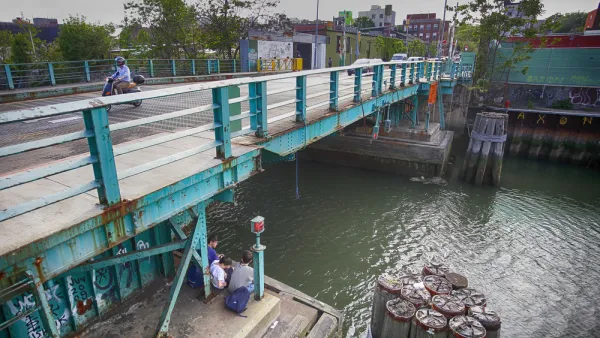I would like to think that the overwhelming response to the question posed in the title would be a resounding, "No!" I never gave the issue much thought before last week because frankly, I didn't really need to. Working in a city like Philadelphia where the overwhelming percentage of proposed projects requires a zoning variance, we've trained ourselves to work within an imperfect system and make the best of what's at hand. (It should be noted that Philadelphia is about to embark upon a process to re-vamp the zoning code, but that is for another post in the future). More importantly, the issues faced by some neighborhoods go a lot deeper than zoning. So why this post?
I would like to think that the overwhelming response to the question posed in the title would be a resounding, "No!" I never gave the issue much thought before last week because frankly, I didn't really need to. Working in a city like Philadelphia where the overwhelming percentage of proposed projects requires a zoning variance, we've trained ourselves to work within an imperfect system and make the best of what's at hand. (It should be noted that Philadelphia is about to embark upon a process to re-vamp the zoning code, but that is for another post in the future). More importantly, the issues faced by some neighborhoods go a lot deeper than zoning. So why this post?
I spent a day last week working in Philadelphia's Francisville neighborhood with a room full of New Urbanists who were in town for their annual Congress. We've been working on a neighborhood plan for Francisville for the past 8 months, so my role was to answer questions and play general tour guide when necessary. By and large, it was interesting to see the community through the eyes of outsiders. That said, I perceived an underlying tone that this neighborhood could somehow be "fixed" by zoning, or more specifically, a Smart Code. This is only a perception on my part and is based on the comments of a handful of people who said something specifically to this effect. One person actually told me that our plan would be meaningless if we didn't create a Smart Code for the community. This assumes that 1) Planning=Zoning; and 2) If we don't, or can't, change the existing zoning then we shouldn't even bother planning, which would effectively put this neighborhood in paralysis.
Outside of cities, I have no real issues with Smart Codes (or at least none I feel it's worth getting into here). But in cities, reality often conflicts with the ideal. Generally speaking, I agree with Smart Code ideals in that in the city, we should build for density and accommodate parking in the rear if possible. In theory, I also am not a big fan of zoning for use.
So where does reality interfere with the Smart Code? Well for one, telling people to build for density and mixed-use will not magically bring a market for new development, which, in Francisville, is only now beginning to resurface after decades of decline. This is not an issue specific to the Smart Code but one about planning for shrinkage versus growth. For now though, let's take a more specific example. A few CNU members told me that some of the local restaurants must be great for the neighborhood (generating activity and introducing a mix of uses and all). What they didn't see is that these establishments are often used for drug trafficking. With similar concerns in mind, the City of Rochester has down-zoned some of its commercial corridors to stop the development of check-cashing and other establishments that have negatively impacted surrounding neighborhoods. Zoning for use, it seems, has its merits.
I wish it didn't. It would be much easier to think of cities as physical gameboards that we try to manipulate formally. Taller here, less dense there, etc. Sounds like a process played out when planning resided in fewer, more powerful hands. As a designer, the idea of somehow shaping a city is still attractive, and a Smart Code certainly allows this illusion. Existing zoning codes, for that matter, also enable some degree of fantasy for city-shaping (depending on the code of course), assuming everyone plays by the rules. But there's the rub, there will never be a code (Smart or not) that will be implemented to the degree that its authors can sit back and watch the city grow according to their wishes. Reality always gets in the way and that is, I think, where our profession gets particularly interesting.

Analysis: Cybertruck Fatality Rate Far Exceeds That of Ford Pinto
The Tesla Cybertruck was recalled seven times last year.

National Parks Layoffs Will Cause Communities to Lose Billions
Thousands of essential park workers were laid off this week, just before the busy spring break season.

Retro-silient?: America’s First “Eco-burb,” The Woodlands Turns 50
A master-planned community north of Houston offers lessons on green infrastructure and resilient design, but falls short of its founder’s lofty affordability and walkability goals.

Test News Post 1
This is a summary

Analysis: Cybertruck Fatality Rate Far Exceeds That of Ford Pinto
The Tesla Cybertruck was recalled seven times last year.

Test News Headline 46
Test for the image on the front page.
Urban Design for Planners 1: Software Tools
This six-course series explores essential urban design concepts using open source software and equips planners with the tools they need to participate fully in the urban design process.
Planning for Universal Design
Learn the tools for implementing Universal Design in planning regulations.
EMC Planning Group, Inc.
Planetizen
Planetizen
Mpact (formerly Rail~Volution)
Great Falls Development Authority, Inc.
HUDs Office of Policy Development and Research
NYU Wagner Graduate School of Public Service




























